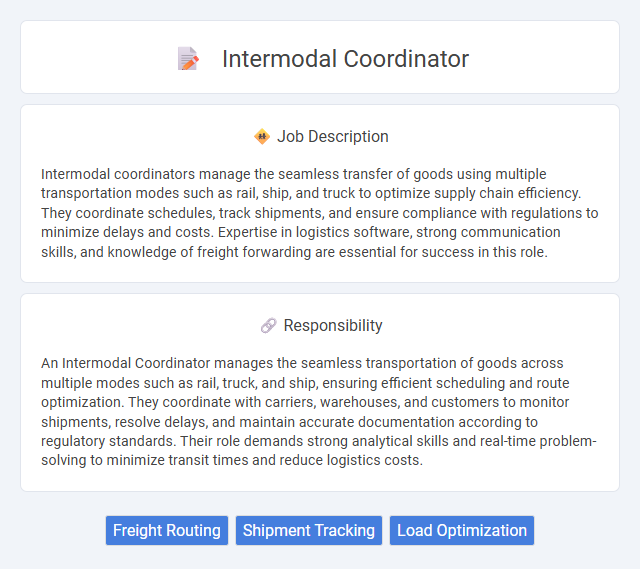
Intermodal coordinators manage the seamless transfer of goods using multiple transportation modes such as rail, ship, and truck to optimize supply chain efficiency. They coordinate schedules, track shipments, and ensure compliance with regulations to minimize delays and costs. Expertise in logistics software, strong communication skills, and knowledge of freight forwarding are essential for success in this role.
Individuals with strong organizational skills and the ability to manage multiple tasks under pressure are likely well-suited for an Intermodal Coordinator role. Those comfortable with coordinating logistics across various transportation modes may find this job aligns with their problem-solving and communication strengths. It is probable that candidates who thrive in fast-paced environments and enjoy teamwork will adapt successfully to the demands of this position.
Qualification
Intermodal coordinator roles demand strong knowledge of logistics, supply chain management, and transportation regulations. Candidates typically need a bachelor's degree in business, logistics, or a related field, coupled with experience in freight forwarding or shipping operations. Proficiency in tracking software, communication skills, and problem-solving abilities are essential for efficient coordination across multiple transportation modes.
Responsibility
An Intermodal Coordinator manages the seamless transportation of goods across multiple modes such as rail, truck, and ship, ensuring efficient scheduling and route optimization. They coordinate with carriers, warehouses, and customers to monitor shipments, resolve delays, and maintain accurate documentation according to regulatory standards. Their role demands strong analytical skills and real-time problem-solving to minimize transit times and reduce logistics costs.
Benefit
Intermodal coordinators likely enhance supply chain efficiency by managing the seamless transfer of goods across multiple transportation modes, which can reduce shipping costs and delivery times. They may improve communication among carriers, warehouses, and clients, potentially minimizing delays and errors. This role probably offers opportunities for professional growth in logistics and a chance to work in a dynamic, fast-paced environment.
Challenge
Intermodal coordinators likely face the challenge of efficiently managing multiple transportation modes to ensure seamless cargo movement. Coordinating schedules, handling unexpected delays, and optimizing routes are probable daily complexities demanding strong problem-solving skills. Effective communication with carriers and clients may also be a frequent hurdle in maintaining operational flow.
Career Advancement
Intermodal coordinators oversee the efficient movement of goods across multiple transportation modes, including rail, truck, and ship, ensuring seamless logistics operations. Mastery in supply chain management software, regulatory compliance, and vendor relations significantly enhances opportunities for promotion to senior logistics manager or operations director roles. Continuous professional development and certification in intermodal transportation elevate career growth prospects and salary potential.
Key Terms
Freight Routing
Intermodal coordinators specialize in optimizing freight routing by managing the seamless transfer of shipments across multiple transportation modes, including rail, truck, and sea. They analyze route efficiencies, cost factors, and transit times to ensure timely and cost-effective delivery of goods. Effective freight routing by intermodal coordinators reduces transit delays, minimizes logistics expenses, and enhances supply chain reliability.
Shipment Tracking
An Intermodal Coordinator expertly monitors shipment tracking across multiple transportation modes, ensuring real-time updates and on-time delivery. Leveraging advanced tracking technologies and logistics software, they optimize route efficiency and provide accurate shipment status to stakeholders. Their role is critical in minimizing delays, managing exceptions, and maintaining seamless communication between carriers and clients.
Load Optimization
Intermodal coordinators specializing in load optimization maximize cargo space efficiency across multiple transportation modes, including rail, road, and sea. They analyze shipment dimensions, weight distribution, and regulatory requirements to ensure cost-effective and compliant loading configurations. Advanced software tools and real-time data tracking enhance their ability to reduce transit times and minimize freight damage.
 kuljobs.com
kuljobs.com